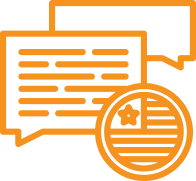Employment Visa
> H-1B

H-1B Specialty Occupation Visas
The H-1B visa is a nonimmigrant visa that allows for temporary employment in the United States. Individuals must be sponsored by an employer for this type of visa.
In order to be eligible for an H-1B visa, the job must qualify as a specialty occupation under at least one of four criteria:
In order to be eligible for an H-1B visa, the job must qualify as a specialty occupation under at least one of four criteria:
- Bachelor’s or higher degree or its equivalent is normally the minimum entry requirement for the position
- The degree requirement for the job is common to the industry or the job is so complex or unique that it can be performed only by an individual with a degree
- The employer normally requires a degree or its equivalent for the position
- The nature of the specific duties is so specialized and complex that the knowledge required to perform the duties is usually associated with the attainment of a bachelor’s or higher degree.
To qualify to accept a job offer under the H-1B program, an individual must meet at least one of four criteria:
- Have completed a U.S. bachelor’s or higher degree required by the specific specialty occupation from an accredited college or university
- Hold a foreign degree that is the equivalent to a U.S. bachelor’s or higher degree in the specialty occupation
- Hold an unrestricted state license, registration, or certification which authorizes you to fully practice the specialty occupation and be engaged in that specialty in the state of intended employment
- Have education, training, or progressively responsible experience in the specialty that is equivalent to the completion of such a degree, and have recognition of expertise in the specialty through progressively responsible positions directly related to the specialty.
Before applying for the H-1B visa, the employer must obtain a certification of a labor condition application (LCA) from the Department of Labor. This application includes certain attestations, a violation of which can result in fines, bars on sponsoring nonimmigrant or immigrant petitions, and other sanctions to the employer. The application requires the employer to attest that it will comply with the following labor requirements:
- The employer will pay the beneficiary a wage which is no less than the wage paid to similarly qualified workers or, if greater, the prevailing wage for your position in the geographic area in which you will be working.
- The employer will provide working conditions that will not adversely affect other similarly employed workers. At the time of the labor condition application there is no strike or lockout at the employer place of business. Notice of the filing of the labor condition application with the DOL has been given to the union bargaining representative or has been posted at the place of business.
After receiving the certified LCA, the employer may submit Form I-129, Petition for a Nonimmigrant Worker, on behalf of the sponsored employee.
The H-1B visa has an annual numerical limit "cap" of 65,000 visas each fiscal year. The first 20,000 petitions filed on behalf of beneficiaries with a U.S. master’s degree or higher are exempt from the cap. Additionally, H-1B workers who are petitioned for or employed at an institution of higher education or its affiliated or related nonprofit entities or a nonprofit research organization, or a government research organization are not subject to this numerical cap.
An H-1B nonimmigrant may be admitted for a period of up to three years. The visa may be extended, but generally cannot go beyond a total of six years, though some exceptions do apply.
The H-1B visa has an annual numerical limit "cap" of 65,000 visas each fiscal year. The first 20,000 petitions filed on behalf of beneficiaries with a U.S. master’s degree or higher are exempt from the cap. Additionally, H-1B workers who are petitioned for or employed at an institution of higher education or its affiliated or related nonprofit entities or a nonprofit research organization, or a government research organization are not subject to this numerical cap.
An H-1B nonimmigrant may be admitted for a period of up to three years. The visa may be extended, but generally cannot go beyond a total of six years, though some exceptions do apply.
Contact Us at
866.987.3646




